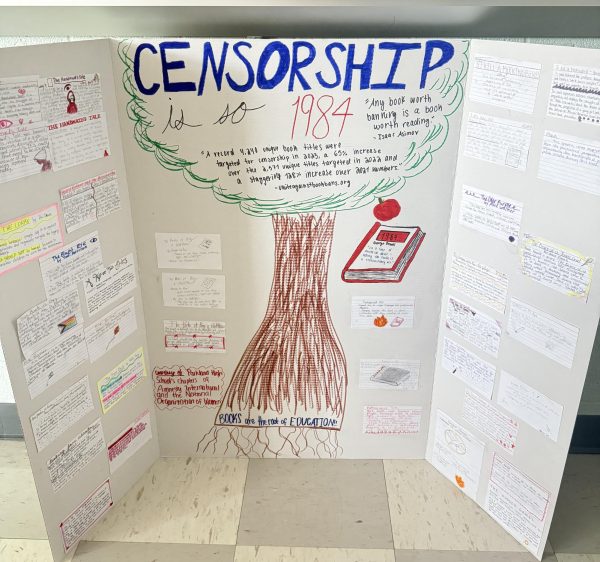Tackling the College Decision Making Process
Photo from commons.wikimedia.org; Vassar College’s Thompson Library in the fall time
April is upon us and we are headed into hopefully the last month in which decision letters are arriving. You’ve received most of your decisions back and there are lots of good options, but now you have no idea how to narrow it down to your final choice. This is where I can help!
Now, I know what you’re all thinking. “She’s a junior, what can she possibly know about deciding which college to go to?” Luckily, I have some pretty coincidentally favorable qualifications that allow me to provide guidance. My parents have been working in higher education since before I was born (and my mom worked in admissions!), I am currently on my own college search process at the moment so I understand your pain and confusion, and I had the privilege of watching my friends navigate the application and commitment process this year.
When applying to college, some of you might have experienced rejection from a school that was very important to you. I know that rejection, especially when you worked so hard, can be wholly frustrating. Just remember that you will end up exactly where you are supposed to, and that the admissions process can be incredibly random. You and your loved ones know that you’re a capable student no matter what, and that’s what truly matters.
So you’ve gotten your acceptances back and you don’t know where to start. I have just the trick for you! To maximize how happy you will be after making your final choice, you should consider three things when comparing your acceptances. The first thing you should look at is how much each school costs, consider program quality, then compare location, and finally consider amenities.
The thing everyone should probably start with is comparing your financial aid offers. College in the 21st century can be very expensive, but it doesn’t have to be. Many schools offer financial aid for lower income students and merit aid for high achieving students. If you received some sort of aid from a school, the first thing you should look at is the breakdown of your package. Packages will typically be broken up into grants, loans, work study, your family’s contribution, and possibly a stipend. Grants do not need to be paid back, and you should definitely see which schools give you the largest grants. There’s also work study, in which you will get a job on campus that will help pay for your tuition. Be incredibly wary of student loans, and always do research on your school and the experiences of alumni paying back their loans. If you cannot afford to take on loans, try to avoid schools that you would have to take out loans for. You cannot file for most chapters of bankruptcy to have your loans forgiven, which could be detrimental for your financials for the rest of your life if you cannot pay them back. Many schools now offer larger packages that do not need to be paid back, so don’t worry, not every school will be so expensive that you have to take out a loan. The way you will know if you need to take out loans is by looking at what each school designates as your expected family contribution, the money that financial aid does not cover. If your EFC is too high and the interest rate for loans offered to you is not doable for your family, you may have to cut that school off your list.
The second most important thing besides the ability to afford a school is the quality of the program that you applied for, not only for those who applied for a major but also for those who applied undecided. The quality of education you’re receiving is very important, especially for job prospects in the future. It all depends upon what type of teaching and coursework is the best for you. If you can handle a tougher course load, consider schools that will cater to that, and if you applied to honors programs, consider those. If you need a more moderate course load, consider schools that offer that as well.
After looking at the quality of each of the programs or majors you’re interested in, consider the look of the campus, how many students attend, and where the school is located. Take virtual or in person tours of campuses to find which ones you love. Finding your college is like falling in love, you may not find the right one at first, but once you find the one it just clicks. Finding the right campus for you isn’t the only important thing, considering where the campus is located is also crucial. Would you like to go somewhere quiet and rural, somewhere suburban, or to a big city? Are you ok with being in the middle of a secluded area, or do you need things to be close to your campus like in a city?
Once you’ve narrowed down cost, program, and location, what will ultimately separate your top choice from other schools is the quality of the facilities and extras on campus. Think: dining, dorm rooms, athletic facilities, classrooms, outdoor spaces, Greek life, study abroad etc. These things may seem trivial, but you’re going to be living here for four years, and it’s important that you are as happy as possible with your choice. Having to worry about school and also all these other smaller things will make your experience way more stressful, which is not ideal. When considering some of these last factors, it’s a good idea to ask yourself how large or small you want your dorm to be, if you’d like to live alone, with one roommate, or in a suite with multiple roommates, or find out if your school has good off-campus housing opportunities for when you’re a junior and senior, etc. Also, it would be a good idea to research bathrooms and laundry opportunities.
I know this is a lot to consider, and I would recommend having your parents or another trusted adult help you sort through this information. If you don’t find a school that has all positives for every aspect I listed, don’t worry. You might have to make some sacrifices depending on your own unique situation and your unique list of acceptances that are available to you. All in all, whatever happens happens and you have successfully navigated the college process! I hope this was helpful, and good luck this fall.
Your donation will support the student journalists of Parkland High School. Your contribution will allow us to purchase equipment and cover our annual website hosting and printing costs.

Gabby is a senior, and this is her second year writing for the Parkland Trumpet. She enjoys writing about politics and current events. She is...








